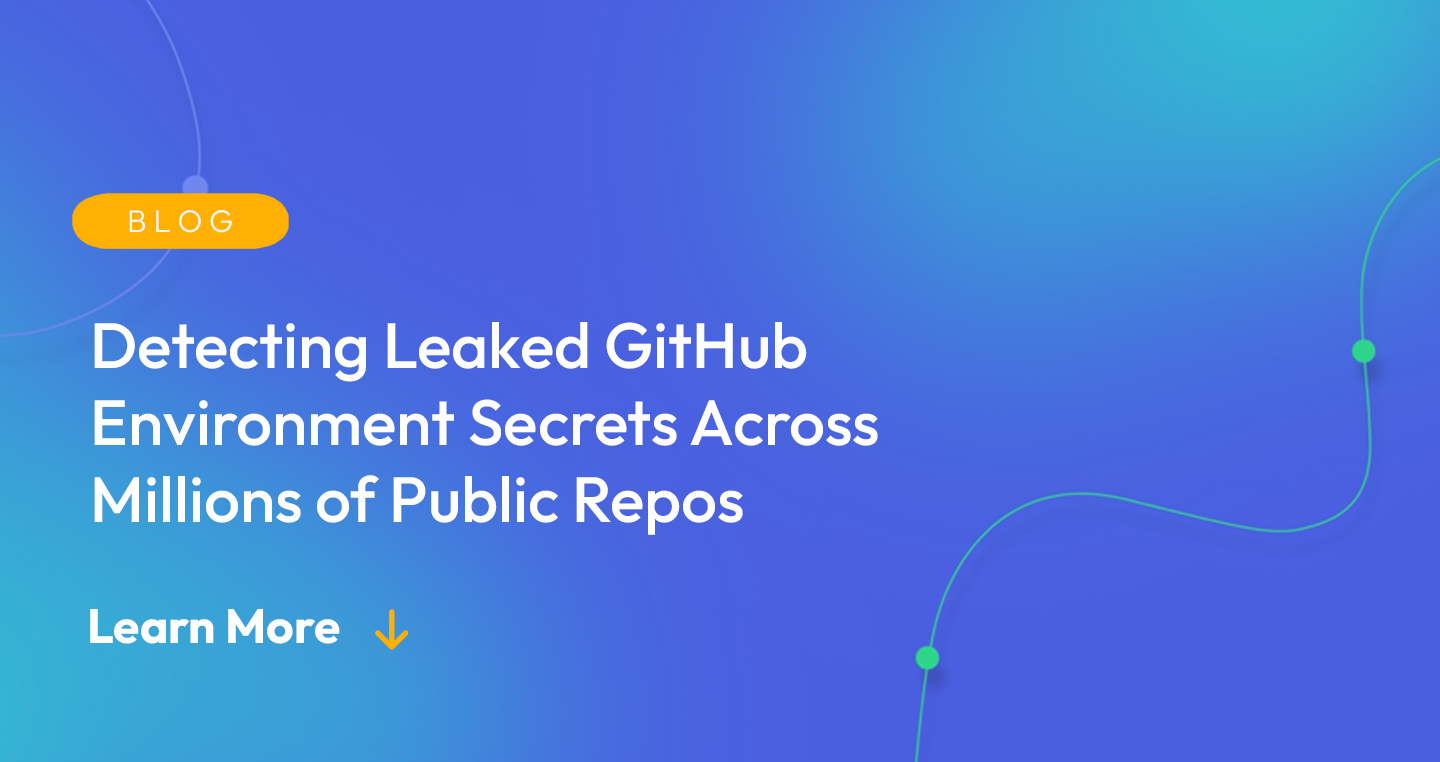
In the realm of software development, secrets are critical pieces of information that authorize access to applications, APIs, servers, and other online resources. They come in many forms including API keys, database credentials, cryptographic keys, and tokens.
GitHub environment secrets are no exception. They play an indispensable role in the development and operations process, ensuring that only authorized users can interact with specific elements of the infrastructure. Human error can lead to GitHub data leaks, which can have major consequences. However, thorough cybersecurity measures can prevent leakages.
Understanding GitHub Environment Secrets and Their Importance
What’s a GitHub Environment Secret?
GitHub, a popular platform among developers for hosting and collaborating on software projects, has a feature known as “secrets” that stores sensitive data. This feature is primarily utilized for storing environment variables in a secure manner. Environment secrets are often used in the context of continuous integration/continuous deployment (CI/CD) pipelines, which are workflows that automatically build, test, and deploy software.
An environment secret can be anything including:
- database username and password
- API key for a third-party service
- cloud platform credentials
These secrets enable developers and applications to interact with other systems securely without exposing sensitive information in the codebase.
Consequences of Leaked GitHub Environment Secrets
While incredibly useful, the power of GitHub environment secrets comes with a significant responsibility. In the wrong hands, they could lead to a serious security breach. When these secrets are accidentally committed and pushed to a public repository, they can provide malicious actors with unauthorized access to private systems, databases, cloud resources, and more.
The severity of this risk underscores the importance of treating GitHub environment secrets with the utmost care. They should never be hardcoded into the application code or inadvertently committed to a public repository. The security implications of such a mistake can be immense, including:
- data breaches
- unauthorized transactions
- infrastructure damage
- reputational harm to the organization
This is why detecting leaked secrets across millions of public repos is not only a crucial aspect of cyber threat intelligence but also a best practice for maintaining the security posture of an organization.
The Scope of the Problem: Public Repositories and Exposed Secrets
GitHub, as one of the most prominent platforms for hosting and collaborating on software projects, is a common venue for accidentally exposed secrets. With over 100 million repositories and thousands of new commits every minute, the sheer volume of code changes increases the likelihood of accidentally committed secrets.
GitHub Environment Secrets and Human Error
While GitHub has implemented features to protect secrets, such as secret scanning, human error remains a significant factor. Developers, under the pressure of deadlines or simply due to a lack of awareness, might inadvertently expose secrets in their code or configuration files. This problem is not confined to novices; even experienced developers occasionally commit this oversight.
Various studies and reports have highlighted the gravity of this problem. According to a report by North Carolina State University, over 100,000 repositories have leaked API tokens and cryptographic keys, with thousands of new repositories leaking secrets every day. A separate study conducted by GitGuardian, a cybersecurity company, indicated that there were over 10 million exposed secret occurrences on GitHub in 2022.
Types of GitHub Environment Secrets
The types of exposed secrets vary. They can include:
- AWS access keys
- Slack tokens
- Google OAuth tokens
- SSH private keys
Integrate the world’s easiest to use and most comprehensive cybercrime database into your security program in 30 minutes.
Any of these could provide an unauthorized individual with access to sensitive resources, leading to data breaches and other security incidents.
Compounding this issue, once these secrets are pushed to a public repo, they become part of the repo’s history. Even if the secret is removed from the latest version of the code, it can still be found by looking at previous commits. Thus, the secret remains accessible until the repository’s history is rewritten, which is a non-trivial task that many developers may not know how to perform.
In essence, the landscape of public repositories is a proverbial minefield of exposed secrets. Detecting and addressing these exposed secrets is a substantial challenge due to the immense scale of the problem..
The Role of Cyber Threat Intelligence in Identifying Leaked Secrets
In an era where cyber threats are growing more complex and widespread, the importance of cyber threat intelligence cannot be overstated. This becomes even more essential in dealing with the issue of leaked secrets across millions of public GitHub repositories. Cyber threat intelligence involves the collection and analysis of information about potential or current attacks threatening an organization. It helps organizations understand and anticipate threats, providing them with informed strategies to mitigate risks.
When it comes to detecting leaked GitHub environment secrets, cyber threat intelligence takes on the role of an always-vigilant watchdog. Utilizing advanced algorithms, machine learning, and artificial intelligence, a sophisticated threat intelligence platform can continuously scan public repositories, detecting any secrets that may have been accidentally committed. This is a task that would be virtually impossible for humans to perform manually given the sheer volume of data.
Such a platform sifts through the noise in the codebase of repositories, identifying patterns and clues that indicate the presence of secrets. It may, for instance, recognize patterns in strings that suggest they are AWS access keys or SSH private keys, among other types of secrets. Moreover, these platforms can detect secrets not only in the most recent version of the code but also in the repository’s history.
Upon detecting an exposed secret, a robust cyber threat intelligence platform would alert the relevant parties, allowing them to take immediate remedial action. This could involve revoking the exposed secret, generating a new secret, and cleaning the repository’s history to eliminate traces of the leaked secret.
What’s important to note here is that while this process is automated, it’s built on a foundation of human expertise. Cybersecurity professionals develop and refine the rules and algorithms that guide the detection process, leveraging their understanding of how secrets are used, how they might be exposed, and what the implications of such exposure are.
Best Practices for Detecting and Addressing Leaked GitHub Environment Secrets
While the responsibility of securing GitHub environment secrets primarily rests with developers and organizations, there are several best practices that can bolster efforts to detect and mitigate the risks associated with leaked secrets.
Coupled with the use of an advanced cyber threat intelligence platform like ours, these practices can provide a comprehensive approach to securing your sensitive data.
Regular Scanning for Exposed Secrets
Regularly scan your repositories for any exposed secrets.
Educating Developers
Ensure your developers understand the risks associated with committing secrets to public repositories and provide them with training on securely managing secrets. This includes instructions on how to use .gitignore files to prevent committing sensitive data, using environment variables to store secrets, and using tools like GitHub’s Secret Scanning feature.
Rapid Response
When a leak is detected, swift action is essential. The longer a secret remains exposed, the greater the risk of it being misused. Once an exposed secret is identified, invalidate it and issue a new one. Then, clean the repository’s history to remove traces of the secret.
Leveraging a Cyber Threat Intelligence Platform
Utilize a robust cyber threat intelligence platform, such as ours, to help monitor, detect, and manage exposure. Our platform, specifically designed to detect leaked secrets, offers several features that streamline this process, including automated scanning, real-time alerts, and detailed reporting.
Limit the Scope of Secrets
Whenever possible, limit the scope of your secrets. If a secret only needs to access a specific resource, don’t give it permissions for others. This way, even if a secret does get leaked, the potential damage is contained.
While these practices can significantly mitigate the risk of secret exposure, they should be part of a broader, holistic approach to cybersecurity. Regular audits, a culture of security, and embracing tools that facilitate safe coding practices are all key components of a robust security posture. With vigilant monitoring, prompt action, and the right tools, the task of detecting and addressing leaked GitHub environment secrets becomes significantly more manageable.
Detecting GitHub Environment Secrets with Flare
GitHub environment secrets play a pivotal role in maintaining the security and integrity of countless software projects. Human error can often inadvertently expose these secrets in public repositories, providing a potential gateway for malicious actors. However, with the power of cyber threat intelligence, it’s possible to scan and detect these leaked secrets across the vast landscape of GitHub repositories.
Flare monitors the clear & dark web and illicit Telegram channels for any external threats, including GitHub environment secrets. Flare automates the monitoring, evaluation, and takedown process of code repository leaks containing sensitive secrets (and malicious domains). After a former employee of a major North American bank posted a GitHub secret, the bank’s CTI team contained the incident in 30 minutes.
Sign up for a free trial with Flare to try it out yourself.


